Exploring CCNA Jobs: Is CCNA Enough to Get a Good Job?

Introduction
The IT industry is ever-growing and changing, which creates a continuous demand for well-skilled professionals in networking. For many, becoming Cisco Certified Network Associates (CCNA) sets a milestone in their career in the field of networking. However, is achieving CCNA certification sufficient to secure a good position?
In order to solve this, we examined work available job advertisements in Indeed.com from the United States, Canada, the United Kingdom, and Australia. This blog will be reviewing the available job options for CCNA certificate holders, areas where most of the jobs are available, and additional skills and experiences that would enhance their chances in the job market. Whether you are a fresh graduate or a professional willing to grow up in the networking domain, this guide is going to help you understand the worth of the CCNA certification in today's job market.
What jobs can you get with CCNA?
The opportunities and job roles in the networking arena are so vast that a person can easily earn after passing a CCNA. From analyzing the job postings of Indeed.com, we found these most common titles of CCNA jobs:

These most representative job titles can be boiled down to the following categories:
Network Engineers
Roles: Network Engineer, Senior Network EngineerNetwork Engineers design and implement network systems and are responsible for their management to ensure the best performance and security. Senior Network Engineers work with more complex network systems and may also work at a strategic level, dealing with network architectures.
Network Administrators
Roles: Network Administrator, System Administrator, Systems AdministratorNetwork and Systems Administrators manage and maintain an organization's infrastructure for networking and IT systems on a daily basis. They make sure all the parts are running smoothly and efficiently.
Technical Support and IT Support
Roles: Support Engineer, Technical Support, IT Support, Support SpecialistNetwork troubleshooters provide technical help with customer service or technical support regarding network-related problems. These professionals assist users in troubleshooting technical problems related to networks and in maintaining the function of such networks.
Systems Engineers
Roles: Systems Engineer, Systems AdministratorThe systems engineer designs and constructs the systems in such a way that they may befittingly serve the requirements of the organization, with the application of hardware and software. He further ensures that the infrastructure stays reliable and works efficiently.
Job levels
Jobs open to CCNA qualified is available from entry-level to higher positions. The data below shows the percentage distribution by levels of position:
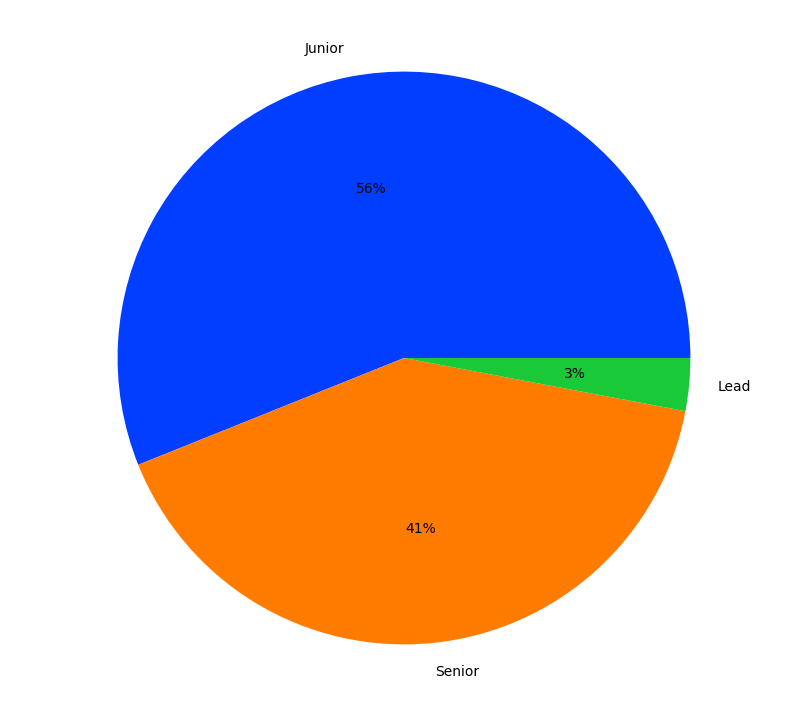
Junior Level (56%)
Most of the job opportunities for a CCNA certification holder are at the junior level. A junior-level position is suitable for fresh graduates from college or those with minimal employment experience. Most job titles that indicate a junior position may include IT Support Specialist, Junior Network Administrator, among others. More so, such positions often list basic networking, troubleshooting, and support activities conducted in close supervision by senior-level professionals.
Senior Level (41%)
A very good number of jobs posted catering to the senior-level professionals. Having a minimum of a few years of industry experience, besides having CCNA credentials, one can opt for designations of Network Engineer, Network Analyst, and Systems Administrator, which require advanced skills in understanding networking concepts and handling projects/tasks of higher complexities.
Lead Level (3%)
A CCNA alone may not be enough for the level of Senior roles, but it is a good foundation. It builds up on experience and years of this acquired over time; with further higher certifications like CCNP or CCIE, one can service themself as a senior-level network engineer or network architect responsible for designing and overseeing an entire network infrastructure.
Where are the CCNA Jobs?
In order to better understand where CCNA-certified professionals are in demand, we analyzed job postings from the United States, Canada, the United Kingdom, and Australia (and New Zealand). A larger circle on the map represents those cities where there are more jobs.
United States
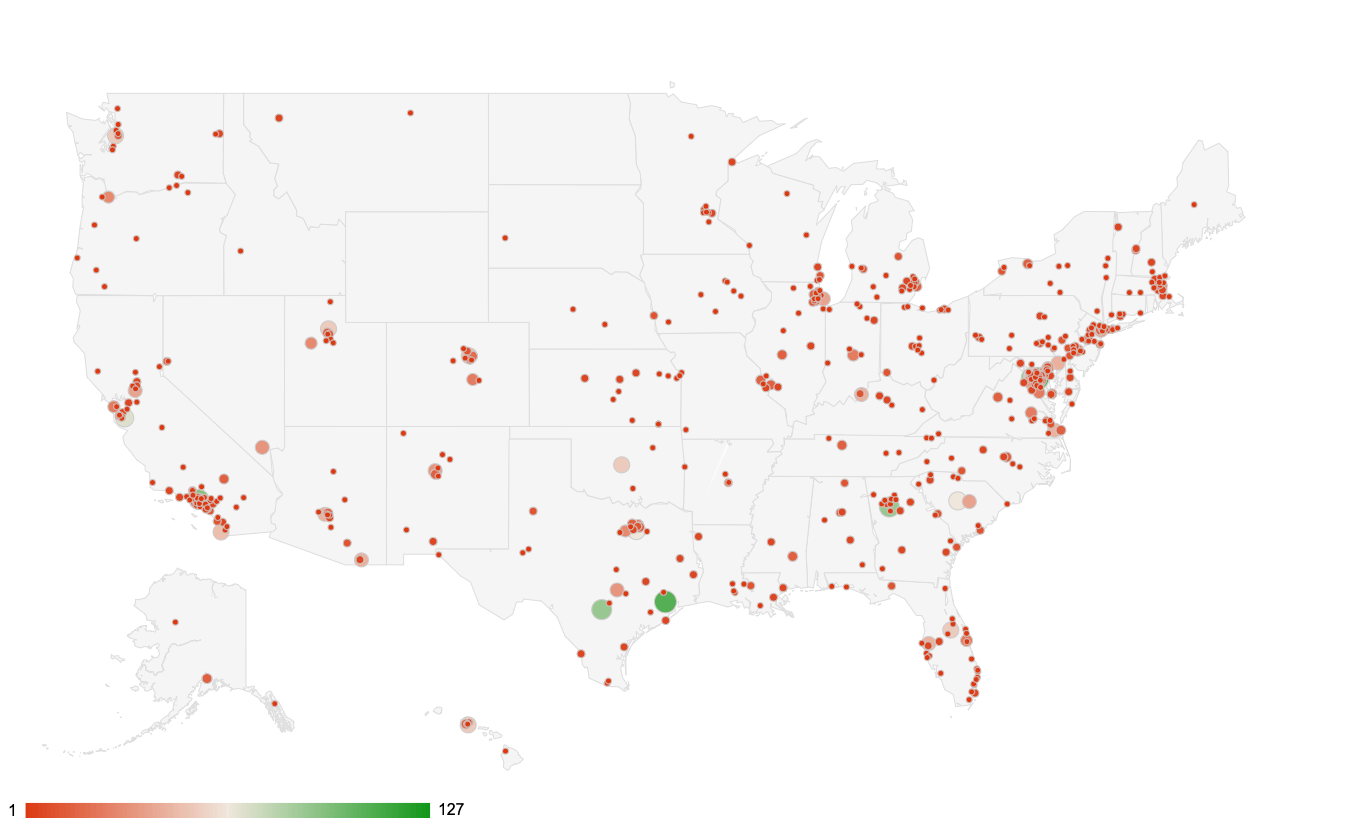
The United States is such a varied, big landscape that it provides unlimited opportunities for CCNA professionals. The top five cities that have the most job listings for CCNA are listed below:
- Washington, D.C. - 300+ jobs*
* including Arlington and other neighboring regions
- Houston, TX - 100+ jobs
- Arlington, TX - 100+ jobs
- Los Angeles, CA - 50+ jobs
- Atlanta, GA - 50+ jobs
They are cities with strong technology industries, many federal and state government agencies, and vibrant business environments that create a demand for networking professionals.
Canada
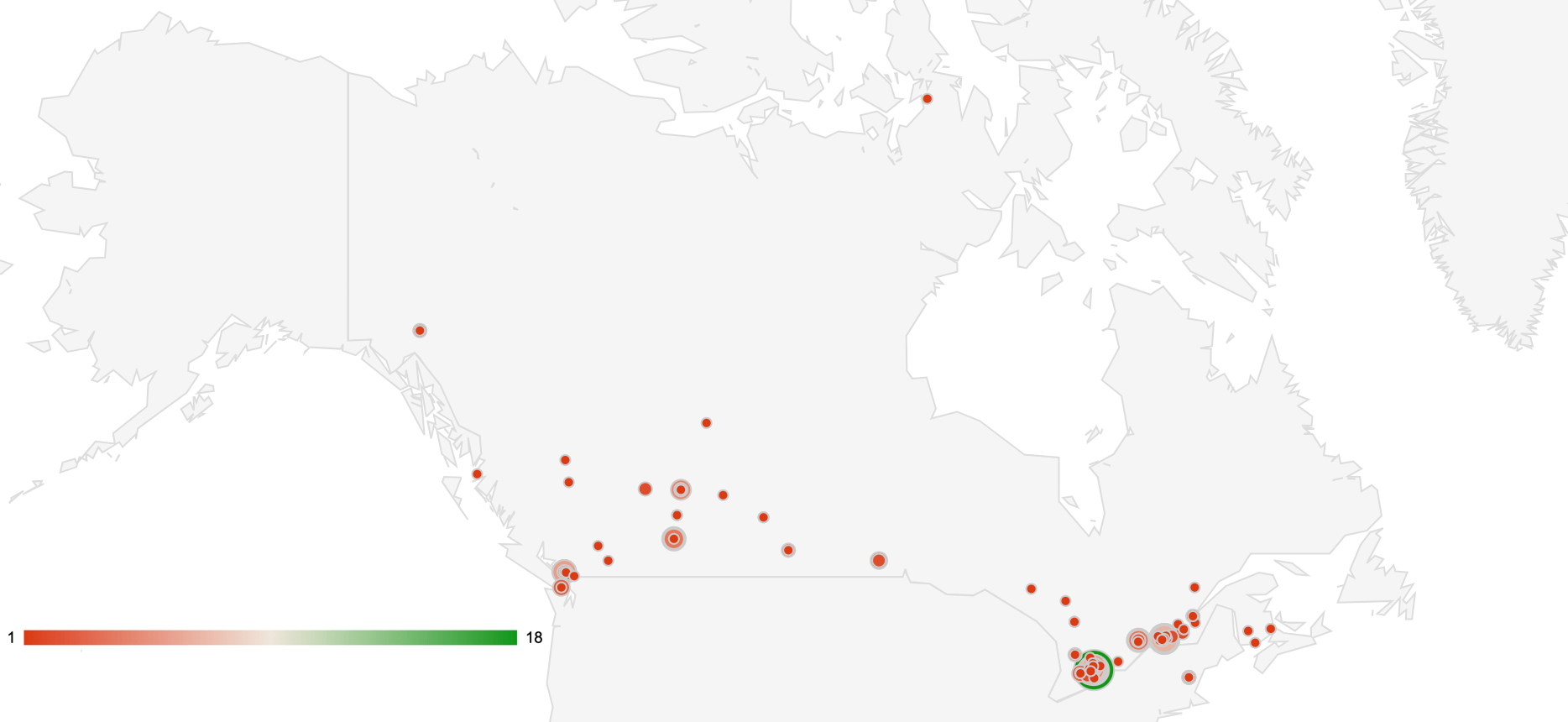
The technology sector is very much live and growing in Canada, especially in major urban centers. Here are the top five cities for CCNA job opportunities:
- Toronto, ON - 50+ jobs
- Montréal, QC - 50+ jobs
- Vancouver, BC - 25+ jobs
- Ottawa, ON - 20+ jobs
- Mississauga, ON - 15+ jobs
This includes Toronto(also Mississauga) and Montréal, where the highest opportunities are provided in both the private and public sectors. It is also the case of Vancouver and Ottawa since important governmental and tech facilities are located there.
United Kingdom
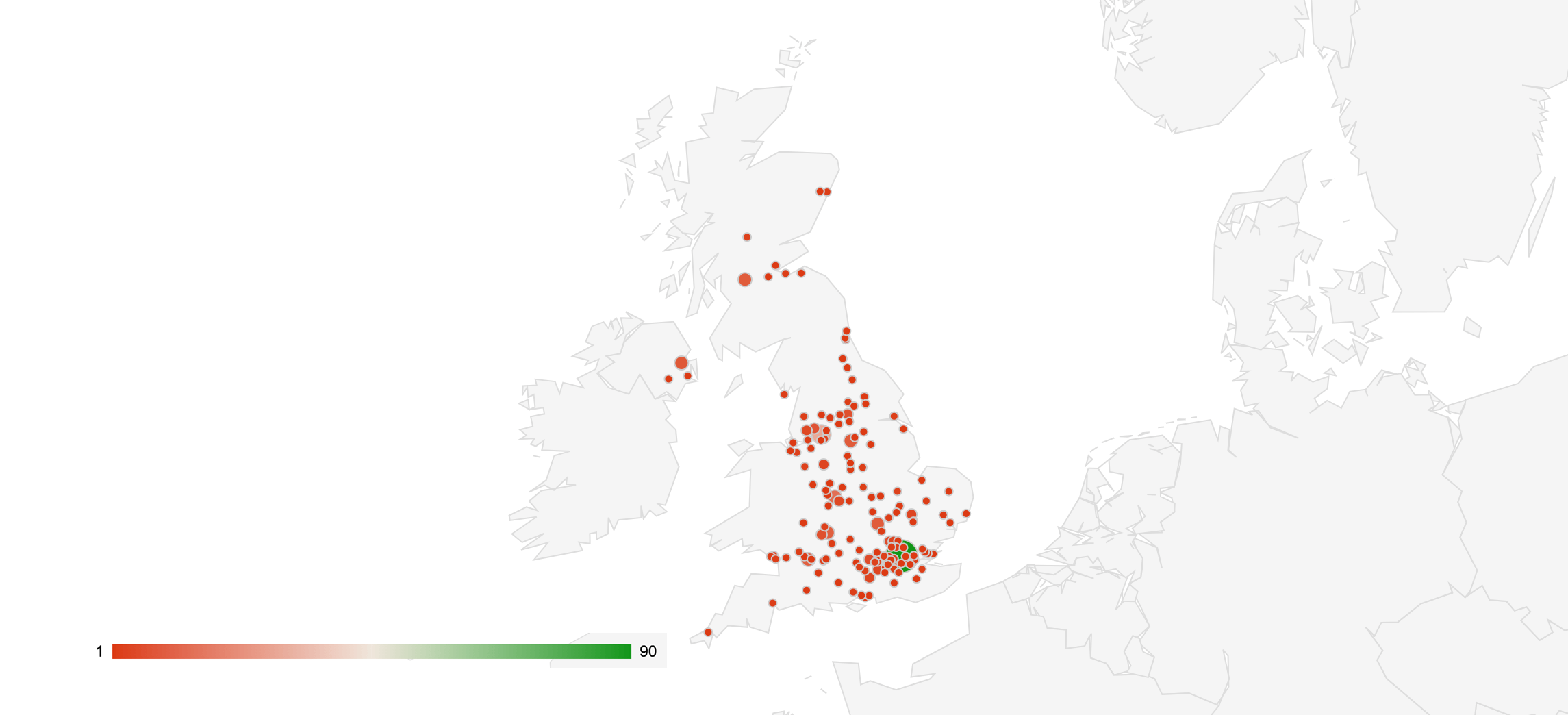
The United Kingdom exhibits a high concentration of job opportunities for CCNA in its key cities. The concentration mirrors the demand for professionals in networking across different regions. The following are the top five cities with the highest job postings:
- London - 90+ jobs
- Manchester - 30+ jobs
- Birmingham - 15+ jobs
- Cheltenham - 10+ jobs
- Bristol - 10+ jobs
London, unsurprisingly for being a financial and technological capital, leads with the highest number of job postings. It is followed by Manchester and Birmingham, which also put up considerable opportunities, reflecting their increasing tech industries.
Australia & New Zealand
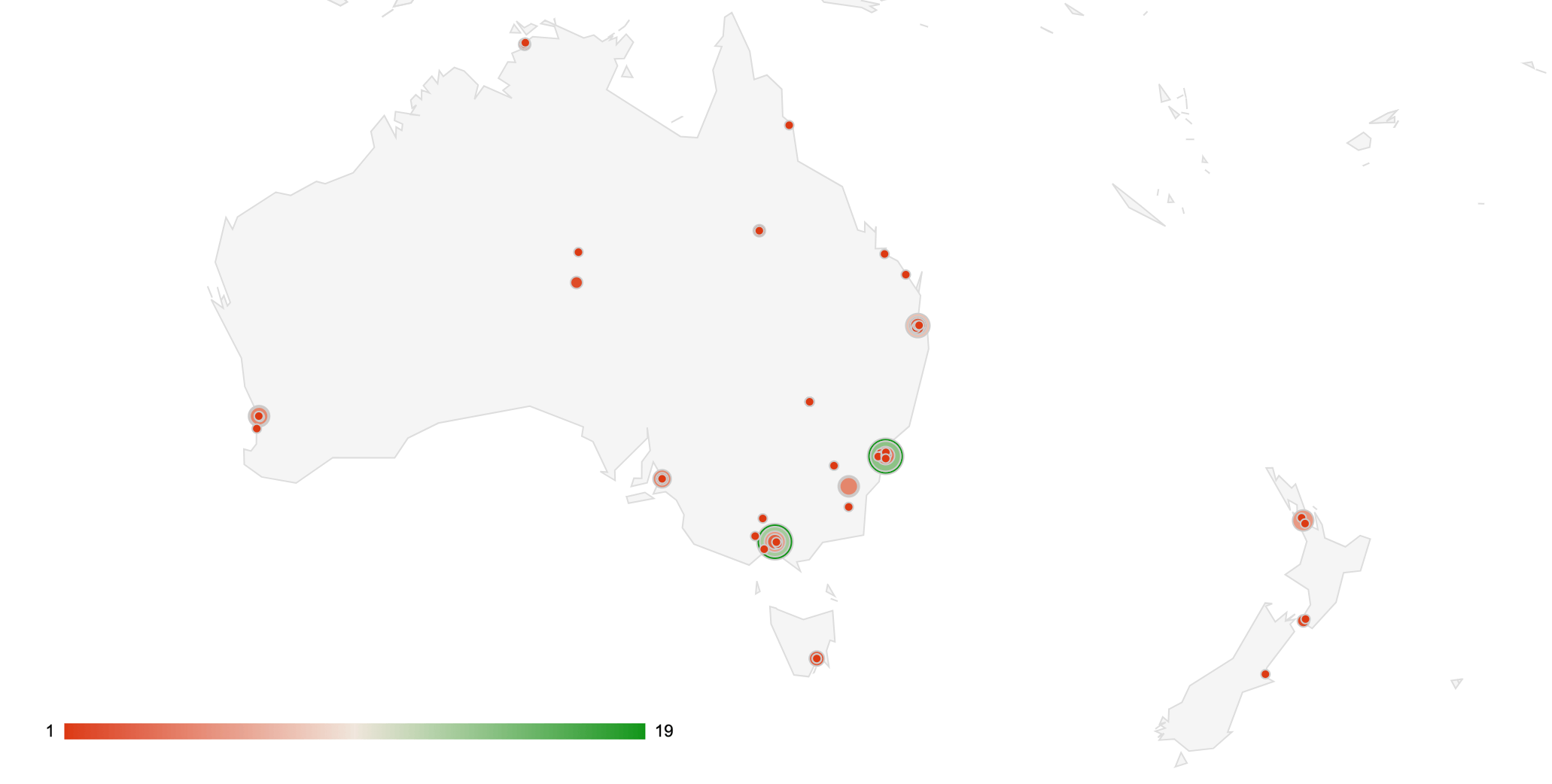
Australia shows a similar trend with CCNA job opportunities across its major cities. The top five cities are:
- Sydney - 50+ jobs
- Melbourne - 40+ jobs
- Brisbane - 15+ jobs
- Perth - 10+ jobs
- Canberra - 10+ jobs
The two largest are Sydney and Melbourne. These have a high density of IT departments and tech companies; therefore, they are perfect places for networking jobs. Canberra also has many opportunities in government agencies where it is the capital.
The demand for CCNA-certified professionals across major cities in the U.S., Canada, the U.K., and Australia is robust. Urban centers and tech hubs show the highest concentrations of job opportunities, indicating where networking skills are most needed. For job seekers, these cities represent the best chances for finding employment in networking roles.
Can I get a job without experience?
One question that lingers in the minds of most people considering a career in networking - specifically, with a CCNA certification - is whether you can actually get a job without prior work experience. We have tried to answer this very question by averaging the requirements from a broad spectrum of advertisements for CCNA jobs.
Specified vs. Not Specified
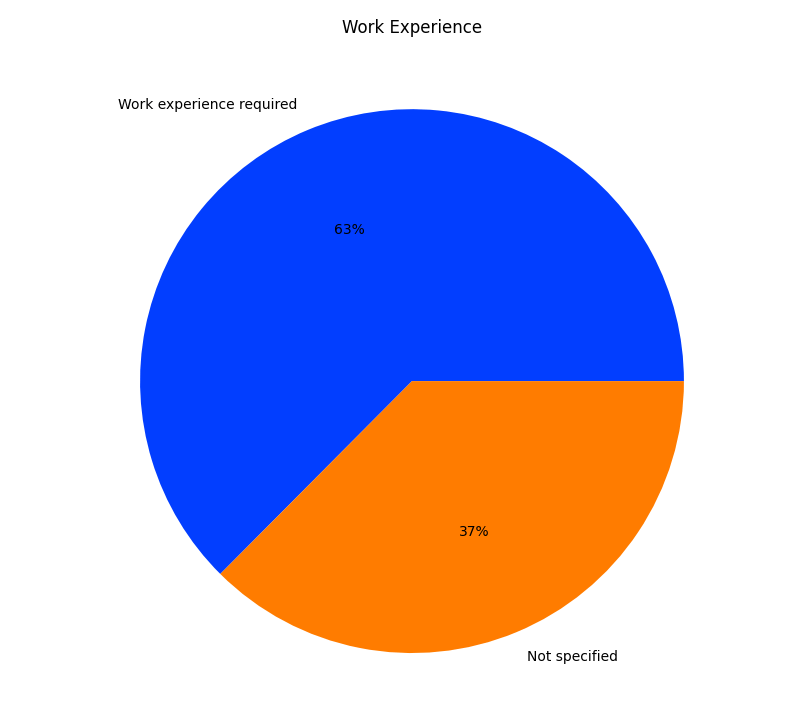
This would mean that a significant portion of employers, almost 38%, do not specify a minimum work experience. That indicates opportunities for the candidate who has no experience, which makes it workable for a new graduate or career changer to get into the networking field with a CCNA.
Minimum Years of Experience Required
We also analyzed the job postings that had a minimum work experience required. The statistics obtained from it are summarized in the histogram, so one can comprehend well what is expected from the experience and prepare themselves accordingly.
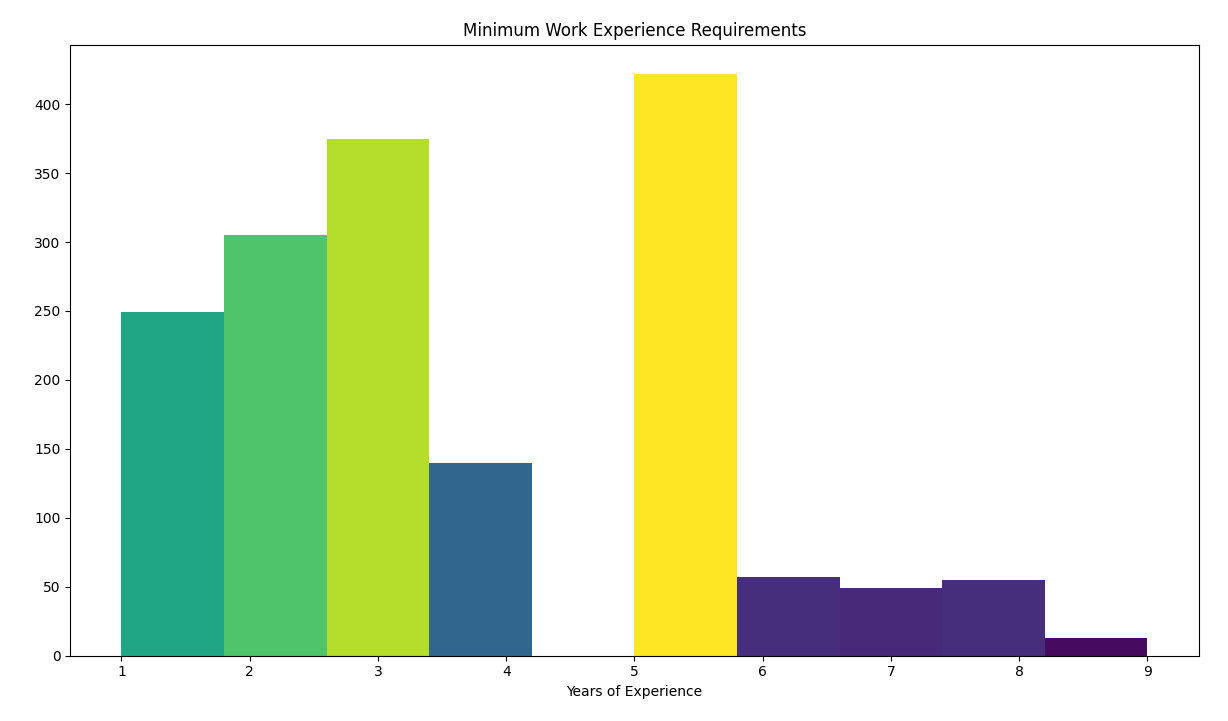
- 1-3 Years
- This is where most of the experience-demanding jobs tend to fall; this shows that early-career professionals with a little experience are still good to go. The same can be quite promising for recent graduates and people new to the field.
- 5 Years
- This is where the need for moderately experienced professionals is reflected—it's the biggest single category for this level of experience.
- 6-9 Years
- The volume of job listings for over 5 years of experience drops sharply; this line graph suggests there are far fewer positions for experienced job seekers compared to mid-level career professionals.
While work experience can definitely be an advantage, the data suggests that a significant number of CCNA job postings do not specify an experience threshold. Most of those who do cite a threshold in years look for 1-3 years of experience, so opportunities should be accessible to people earlier in their career. So, in case you lack experience but have already passed your CCNA certification exam, then there's still a good chance of getting the job if you focus on job postings that do not require experience or at least demand a very minimal amount of experience for the position.
What Skills do you need at the same time?
While preparing for a career with a CCNA certification, it is extremely important to understand the other skills one needs to have along with the knowledge of networking. In our attempt to extract information from job postings using NLP techniques, we have identified a set of skills. Below is a chart containing the most commonly listed skills in job descriptions related to CCNA jobs:
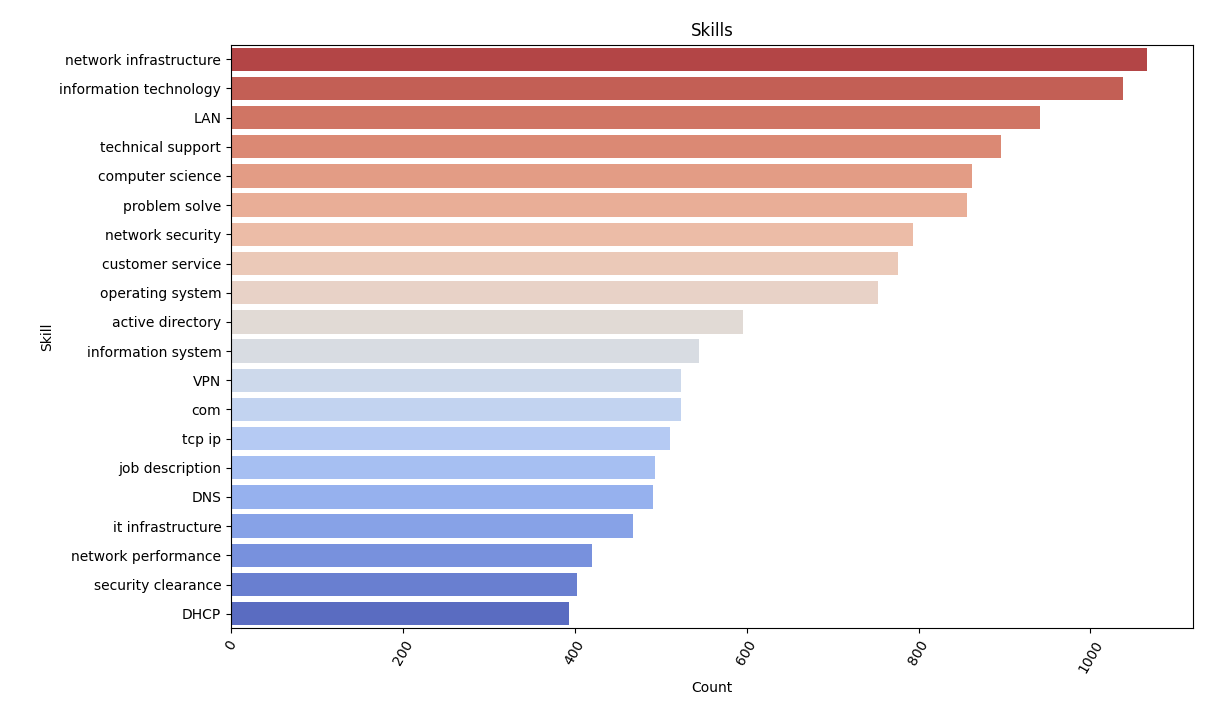
Top 5 Skills
- Network Infrastructure
- Understanding setup, administration, and troubleshooting of the network infrastructure. A very broad array of network infrastructure design through development and maintenance.
- Information Technology(IT)
- Good knowledge in general IT practices and principles. Hardware, software, and other IT systems are also to be known for this.
- LAN (Local Area Network)
- There is much importance for expertise in managing and troubleshooting a LAN. This would involve providing efficient and secure communication in a given, small geographical area, say an office or campus.
- Technical Support
- The main responsibility includes giving technical support for any problem, helping users out, and keeping the systems in good shape so that downtime is minimized.
- Computer Science
- A background in computer science helps one have a deep understanding of programming, algorithms, and the operations of systems.
You will be able to enhance your employability and effectiveness in networking roles by developing these complementary skills, in addition to your CCNA certification. The following are some of the key areas an employer looks into while considering a candidate for network management and troubleshooting, security, performance, and end-user support. You can be well-equipped in these areas, thereby meeting the needs and expectations of the industry.
Conclusion
The CCNA certification will be a very good step toward the job market in networking. The demand and opportunities for such professionals are huge, spread across all regions, more significantly in countries like the U.S., Canada, Australia, and the U.K. However, while a CCNA provides a solid foundation, it is often not enough on its own. Employers generally seek a candidate that combines CCNA certification, practical experience, and a range of complementary skills. Many of the advertisements include the criteria of minimum work experience, and on average it seems to be around 1 to 5 years. There are also demanding skills of network infrastructure, IT, LAN, technical support, and network security. In other words, it is a valuable CCNA certification that may open different doors, but when complemented with experience and a wide set of skills, relevant to the job, will definitely enhance your job prospects.
Although the journey may be challenging, keep learning and stay confident in your abilities—the rewards will be absolutely worth it. Your career path will be an exciting and promising adventure.